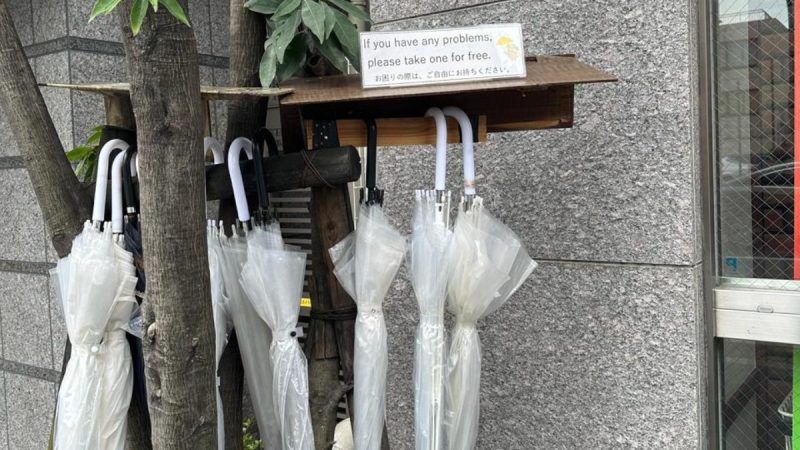Imagine strolling down the streets of Kyoto, Japan, on a rainy day. Amidst the gentle pitter-patter of raindrops, you come across a sight that speaks volumes about the culture and thoughtfulness of the people here. Rows of transparent communal umbrellas, neatly lined up, inviting passersby to shield themselves from the rain. It’s not just about convenience; it’s a symbol of kindness, respect, and communal care. But as we venture beyond the serene streets of Kyoto and into the bustling cities of India, we encounter a different reality.
Kyoto’s Communal Umbrellas Culture
So much to learn from #Japan and it’s people. Just see this and read the board… It was raining in #Kyoto and we saw many people use these and leave it at another place. This was on a random street corner. Almost every place (hotel/mall/stores) has these transparent umbrellas… pic.twitter.com/ifo0jYaW05
— Ajay Rotti (@ajayrotti) April 8, 2024
Ajay Rotti, an X (previously known as Twitter) user, sparked a conversation that delves into the heart of a complex issue: can the practice of leaving umbrellas out for communal use thrive in a country grappling with myriad challenges? “So much to learn from #Japan and its people,” Ajay said in his post. “Just see this and read the board…” He went on to describe how, amidst the rainy streets of Kyoto, people freely used these transparent umbrellas and left them at another spot for others to use.
Ajay couldn’t help but draw a sharp contrast to his own experiences back home in India. He pondered, “We struggled with people stealing helmets of rental bikes. I wonder how many umbrellas would be left behind for use if such a similar thing were to be implemented in our country.”
What Netizens Think About Its Potential In India?
The responses to Ajay’s post reflect a spectrum of perspectives. Some echo his sentiments, acknowledging the cultural barriers that may impede the success of such initiatives in India. Others express scepticism, citing India’s ongoing struggles with basic necessities like food and shelter as primary obstacles.
India is still struggling with basic necessities like health, education and shelters, how on earth we could think of imitating Japan without solving above issues first.
— Abhinav Kumar (@Abhinav18602715) April 8, 2024
One user voiced the sentiments shared by many, highlighting the pressing issues of health, education, and shelter that still plague the nation. “India is still struggling with necessities,” he pointed out, questioning the practicality of adopting such initiatives without addressing fundamental challenges first.
Making a completely different point. It is about culture and respect. Forget other problems.. I am not basic necessities. Leave that for a minute and think of this… If we start this in Mumbai or Bangalore.. What would happen to the Umbrellas? Do you think we have the culture to…
— Ajay Rotti (@ajayrotti) April 8, 2024
Ajay, however, redirected the conversation to the heart of the matter – culture and respect. He urged others to momentarily set aside the broader societal issues and contemplate the essence of cultural values. “If we start this in Mumbai or Bangalore… What would happen to the umbrellas?” he asked. “Do you think we have the culture to take care of it as ours and drop it after we use it in another place for others to use?”
We are a poor country saab… You can’t expect it in India. Still many Indians are struggling for food everyday. Comes umbrella after.
— Paul muadib atreides (@Ajithadam) April 9, 2024
There is an inherent problem with our civic sense, unfortunately. That also comes across in our littering or even vandalising of public property.
— Roopa B (@Roopa13B) April 8, 2024
The ensuing discussion captured a spectrum of opinions, reflecting the complexities of Indian society. Some expressed admiration for Japan’s altruistic practices, others resonated with Ajay’s concerns about the feasibility of such initiatives in India. One individual poignantly remarked, “In India, we have to chain the toilet mug in a train so that it is not stolen. If we start keeping umbrellas outside, they will be sold the next in the near market.”
The dialogue surrounding free umbrellas in Japan served as a mirror reflecting the cultural values and socio-economic realities. It certainly sparked conversations about the potential for change amidst the complexities of modern-day India.
Cover Image Courtesy: Ahay Rotti/X





